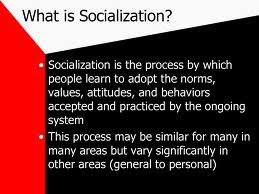Thursday, May 10, 2012
Stages Of Self-Development
Genesis of the Self
Commentary On Self Continued
George Herbert Mead informs us that a fully developed self must pass through three stages. Meaning is not required for behavior during the preparatory stage when an infant begins to imitate the behavior of other people. The imitatative act is simply
mimicking another person's behavior. Meaning becomes a very important part of
behavior in Mead's play stage of self development for it is at this level where
the child intentionally takes on the role -- mother, teacher, cowboy, etc. -- of
some significant other. The third stage of self-development or game stage is the
"completing" stage of self. This is the stage of self-development when one
becomes aware of many of societies socially defined roles. Meltzer informs us:
"This sort of situation is exemplified by the game of baseball--to use Mead's
own illustration: Each player must visualize the intentions and expectations of
several other players. In such situations the child must take the roles of
groups of individuals as over against particular roles. The child becomes
enabled to do this by abstracting a `composite' role out of the concrete roles
of particular persons. In the course of his association with others, then, he
builds up a generalized other, a generalized role or standpoint from which he
views himself and his behavior. This generalized other represents, then, the set
of standpoints which are common to the group." (Meltzer l959, p. 16.)
As far as the socialization process is concerned (and we are all a product of
that process), Mead's stages of self development represent a comprehensive
analysis of how we grow into the person we have a chance to become. And, it
follows from this analysis that if we are to endure in this crazy world where
"one man's ceiling is another man's floor", we must continue to shuffle
(mentally, if not physically) from one social role to another. Role taking, at
the very least, expands our sense of sympathetic introspection as it provides us
with the skills that become very important in the conflict resolution process.
But, I would argue, in the genesis of self, there is more going on then Mead's
description of role taking. We are most definitely a product of the
socialization process, but we are also more than this process and Mead himself
acknowledges "this in addition to" aspect of ourselves when he introduces the
concept of the "generalized other."
Subscribe to:
Post Comments (Atom)






No comments:
Post a Comment